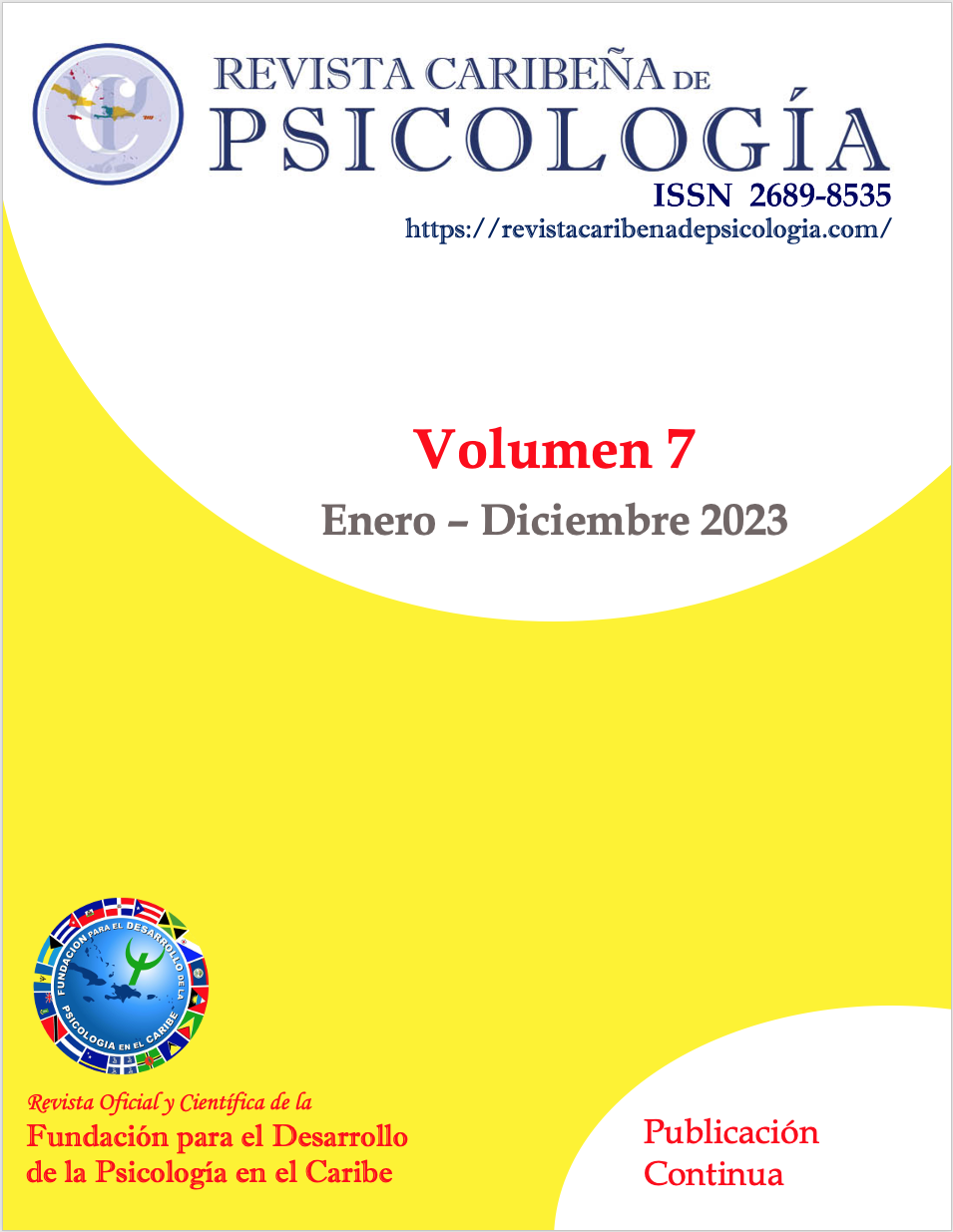Capital Psicológico, Satisfacción con la Vida y la Jubilación en una Muestra de Personas Jubiladas en Puerto Rico
DOI:
https://doi.org/10.37226/rcp.v7i1.7207Palabras clave:
capital psicologico, jubilación, satisfacción con la jubilación, Satisfacción con la vidaResumen
La jubilación es una de las etapas dentro de la vida de un individuo más estudiada en los pasados años dado el aumento poblacional de las personas mayores de 60 años. La presente investigación tuvo un diseño cuantitativo no experimental transversal exploratorio-correlacional y buscó auscultar la relación entre el capital psicológico, la satisfacción con la vida y la satisfacción con la jubilación en una muestra por disponibilidad de 170 personas jubiladas en Puerto Rico entre las edades de 50 a 80 años. Los resultados mostraron que existe una relación entre las variables bajo estudio. Confirman, además, que no existen diferencias estadísticamente significativas en los niveles de capital psicológico, la satisfacción con la vida y la satisfacción con la jubilación tomando en consideración el género ni el tiempo que llevan jubilados los participantes. Concluimos que el desarrollo y fortalecimiento del capital psicológico como herramienta y recurso psicológico debe considerarse como parte de las estrategias de ajuste a la jubilación.
Citas
Adams, G. & Rau, B. (2011). Putting off tomorrow to do what you want today: Planning for retirement. American Psychologist, 66(3), 180-192. https://doi.org/10.1037/a0022131
Asebedo, S. D., & Seay, M. C. (2014). Positive psychological attri-butes and retirement satisfaction. Journal of Financial Counse-ling and Planning, 25(2), 161–173.
American Psychological Association. (2009). APA Dictionary of Psychology. https://dictionary.apa.org/life-satisfaction
Atchley, R. (1975) Adjustment to loss of job and retirement. Inter-national Journal of Aging and Human Development, 6(1), 17-27. https://doi.org/10.2190/EHU3-VCRV-VCRJ-04NU
Avey, J., Luthans, F., Jensen, S. (2009). Psychological Capital: A positive resource for combating employee stress and turnover. Human Resources Management, 48(5), 677-693. https://doi.org/10.1002/hrm.20294
Avey, J., Luthans, F., Smith, R., & Palmer, N. (2010). Impact of positive Psychological Capital on employee well-being over time. Journal of Occupational Health Psychology, 15(1), 17-28. https://doi.org/10.1037/a0016998
Azizli, N. & Atkinson, B. & Baughman, H. & Giammarco, E. (2015). Relationships between general self-efficacy, planning for the future, and life satisfaction. Personality and Individual Differences, 82, 58-60. https://doi.org/10.1016/j.paid.2015.03.006
Banjare, P., Dwivedi, R. & Pradhan, J. (2015). Factors associated with the life satisfaction amongst the rural elderly in Odisha, India. Health Qual Life Outcomes 13, 201. https://doi.org/10.1186/s12955-015-0398-y
Batz-Barbarich, C. & Tay, L. & Kuykendall, L. & Cheung, H. (2018). A meta-analysis of gender differences in subjective well-being: estimating effect sizes and associations with gen-der inequality. Psychological Science, 29(9),1491-1503. https://doi.org/10.1177/0956797618774796
Becchetti, L. & Conzo, G. (2022) The gender life satisfac-tion/depression paradox. Social Indicators Research: An Interna-tional and Interdisciplinary Journal for Quality of Life Measure-ment, 160(1), 35-113. https://doi.org/10.1007/s11205-021-02740-5
Bhat, Sajad. (2017). Psychological capital as related to life satisfac-tion among sports coaches. National Journal of Multidisciplinary Research and Development, 2(3), 300-302.
Burhanuddin, N. A. N., Ahmad, N. A., Said, R. R., & Asimiran, S. (2019). A systematic review of the psychological capital (PsyCap) research development: Implementation and gaps. International Journal of Academic Research in Progressive Educa-tion and Development, 8(3), 133–150. http://dx.doi.org/10.6007/IJARPED/v8-i3/6304
Caprara, M., Di Giunta, L., Bermúdez, J., & Caprara, G. V. (2020). How self-efficacy beliefs in dealing with negative emotions are associated to negative affect and to life satisfaction across gender and age. PLoS ONE, 15(11), Article e0242326. https://doi.org/10.1371/journal.pone.0242326
Champion, D. (1981). Basic statistics for social research. Macmi-llan, 1-452. https://doi.org/10.1371/journal.pone.0242326
Cumming, E. (1964). New thoughts on the theory of disengage-ment. Springer Science & Business Media. https://doi.org/10.1007/978-3-662-38534-0_1
Daraba, D., Wirawan, H., Salam, R. & Faisal, M. (2021) Working from home during the corona pandemic: Investigating the ro-le of authentic leadership, psychological capital, and gender on employee performance. Cogent Business & Management, 8(1). https://doi.org/10.1080/23311975.2021.1885573
Díaz, R., Felici, M., R., Cases, A & Ruiz-Serrano, K. (2021). Adulto Mayor 2019. División de Prevención y Control de Enfermedades Crónicas, Secretaría de Promoción para la Salud del Departamento de Salud de Puerto Rico. https://www.salud.gov.pr/CMS/DOWNLOAD/5543
Diener, E. (1984). Subjective well-being. Psychological Bulletin, 95, 542-575.
Diener, E., Emmons, R., Larsen, R.; Griffin, S. (1985). The satisfac-tion with life scale. Journal of Personality Assessment, 49(1), 71-75. https://doi.org/10.1207/s15327752jpa4901_13
Diener, E. (2012). New findings and future directions for subjec-tive well-being research. American Psychologist, 67(8), 590–597. https://doi.org/10.1037/a0029541
Ehrhardt, J. & Saris, W. & Veenhoven, R. (2000). Stability of life-satisfaction over time: analysis of change in ranks in a national population. Journal of Happiness Studies, 1(2), 177-205.
Eisman, M., Verbij, T., Henkens, K. (2019). Older workers’ plans for activities in retirement: the role of opportunities, spousal support, and time perception. Psychology and Aging, 34(5), 738-749, https://doi.org/10.1037/pag0000377
Elder, H. & Rudolph, P. (1999). Does retirement planning affect the level of retirement satisfaction?. Financial Services Review, (8), 117-127. https://doi.org/10.1016/S1057-0810(99)00036-0
Feldman, D. (1994). The decision to retire early: A review and conceptualization. The Academy of Management Review, 19(2), 285-311. https://doi.org/10.2307/258706
Fernández, J., Crego, A. & Alcover, C. (2011). La transición hacia el retiro: adaptación en una muestra de prejubilados españo-les de la escala Retirement Satisfaction Inventory. Revista Es-pañola de Geriatría y Gerontología, 46(3), 139-146. https://doi.org/10.1016/j.regg.2010.11.009
Gana, K., Bailly, N., Saada, Y., Joulain, M., Trouillet, R., Herve, C. & Alaphilippe, D. (2013). Relationship between life satisfac-tion and physical health in older adults: A longitudinal test of cross-lagged and simultaneous effects. Health Psychology, 32(8), 894-904. https://doi.org/10.1037/a0031656
George, L. & Clipp, E. (1991). Subjective components of aging well. Generations: Journal of the American Society on Aging, 15(1), 57-60.
González-Rivera, J. A., & Rosario-Rodríguez, A. (2020). Caracterís-ticas psicométricas de la Escala de Satisfacción con la Vida (SWLS) en una muestra de adultos puertorriqueños. Revista Puertorriqueña de Psicología, 31(1), 128-139.
Havighurst, R. J., & Albrecht, R. (1953). Older people. Longmans, Green.
Hernández-Sampieri, R., Mendoza, C. (2018). Metodología de la investigación: las rutas cuantitativa, cualitativa y mixta. McGraw Hill Interamericana Editores.
Hornstein, G. & Wapner, S. (1985). Modes of experiencing and adapting to retirement. Journal of Aging and Human Develop-ment, 21(4), 291-315. https://doi.org/10.2190/4nra-2uy5-uva3-4rpq
Hsu, S., Wang, Y., Chen, Y. & Dahlgaard-Park, S. (2014). Building business excellence through psychological capital. Total Quality Management, 25(11), 1210-1223. https://doi.org/10.1080/14783363.2014.913349
Inga, J. & Vara, A. (2006). Factores asociados a la satisfacción de vida de adultos mayores de 60 años en Lima-Perú. Universitas Psychologica, 5(3), 478-485.
Jiménez, I., Chiesa, R., & Topa, G. (2019). Financial Planning for Retirement: Age-Related Differences Among Spanish Wor-kers. Journal of Career Development, 46(5), 550–566. https://doi.org/10.1177/0894845318802093
Joshanloo, M. & Jovanović, V. (2020). The relationship between gender and life satisfaction: analysis across demographic groups and global regions. Arch Womens Ment Health, 23(3), 331-338. https://doi.org/10.1007/s00737-019-00998-w
Kim, S. & Feldman, D. (2000). Working in retirement: The antece-dents of bridge employment and its consequences for quality of life in retirement. The Academy of Management Journal, 43(6), 1195-1210. https://doi.org/10.2307/1556345
Koopman, J. & Wang, M. (2016). Resource based dynamic perspective. The Encyclopedia of Adulthood and Aging. John Wiley & Sons.
LaBauve, B. & Robinson, C. (1999). Adjusting to retirement: Con-siderations for counselors. Adultspan Journal, 1(1), 1-12. https://doi.org/10.1002/j.2161-0029.1999.tb00078.x
Lehr, U. (1980). Psicología de la senectud. Herder.
Leturia (1998). Jubilación y calidad de vida. Revista Española de Geriatría y Gerontología, 33(90) ,9-16.
Locke, E. A. (1976). The nature and causes of job satisfaction. En M.D. Dunnette (Ed.), Handbook of industrial and organizational psychology (pags. 1297-1349). Rand McNally College Publis-hing Company.
Long K., Kim, E., Chen, Y., Wilson, M., Worthington, E., Van-derWeele, T. (2020). The role of Hope in subsequent health and well-being for older adults: An outcome-wide longitudi-nal approach. Global Epidemiology, 2. https://doi.org/10.1016/j.gloepi.2020.100018
Luthans, F., Youssef, C. & Avolio, B. (2007). Psychological Capital: Developing the human competitive edge. Oxford University Press.
Luthans F, Youssef, M., Avolio B. (2015). Psychological capital and beyond. Oxford University Press.
Luthans, Y. & Youseff, C. (2007). Positive organizational behavior in the workplace: The impact of hope, optimism, and resilien-ce. Journal of Management, 33(5), 774-800. https://doi.org/10.1177/0149206307305562
Madrid, A., Garcés, E. (2000). La preparación para la jubilación: Revisión de los factores psicológicos y sociales que inciden en un mejor ajuste emocional al final del desempeño laboral. Anales de la Psicología, 16(1), 87-99. https://doi.org/10.6018/analesps
Martínez, M., González, N., Oudhof, H. & Domínguez, A. (2012). Satisfacción con la vida asociada al apoyo familiar en la peri-menopausia y posmenopausia. Salud Mental, 35(2), 91-98.
Martínez-Lugo, M.E. & Rodríguez-Montalbán, R. (2020), Jubila-ción laboral: nuevo proceso de vida. En C. García Coll & N. Vélez Agosto (Eds.), Perspectivas en desarrollo humano: preven-ción y promoción en adultos y envejecidos (pags.219-241). Publica-ciones Gaviota.
Marziali, E., & Donahue, P. (2001). Resilience indicators of post retirement Well-Being. Social and Economic Dimensions of an Aging Population Research Papers, 49, McMaster University.
Meseguer, M., Soler, M., Fernández, M & García, M. (2017). Eva-luación del Capital Psicológico en trabajadores españoles: di-seño y estructura empírica del cuestionario OREA. Anales de la Psicología, 33(3), 714-721. http://dx.doi.org/10.6018/analesps.33.3.261741
Moragas, R. (1991). Gerontología social: envejecimiento y calidad de vida. Editorial Herder.
Wang, M. & Shi, J. (2014). Psychological research on retirement. Annual Review of Psychology, 65, 209-233. https://doi.org/10.1146/annurev-psych-010213-11513 1
Neira, F., & Garcia, G. (2015). Efectos del capital psicológico en los resultados individuales: un estudio en el colectivo de los in-genieros. Revista Galega de Economía, 24(2), 17-32.
Neugarten, B. L., Havighurst, R. J., & Tobin, S. S. (1961). The measurement of life satisfaction. Journal of Gerontology, 16, 134–143. https://doi.org/10.1093/geronj/16.2.134
Newman, A., Ucbasaran, D., Zhu, F., Hirst, G. (2014). Psychologi-cal capital: A review and synthesis. Journal of Organizational Behavior, 35. https://doi.org/10.1002/job.1916
Omar, A., Salessi, S., & Urteaga, A. (2014). Diseño y validación de una nueva escala para medir capital psicológico. Liberabit, 20(2), 315-323.
Organización Mundial de la Salud. (2022). Ageing and health. https://www.who.int/news-room/fact-sheets/detail/ageing-and-health
Perkins, K. (1991). Blue-collar women and retirement. Social Work Research and Abstract. Abstract of Disertation, 27(3).
Pimentel, C. & Freitas, L. (2015). La importancia de la resiliencia para el bienestar en la jubilación. Gale Academic OneFile, 25(61). http://dx.doi.org/10.1590/1982-43272561201507
Pramanik, S. & Biswal, S. (2020). Ageism, psychological capital and life satisfaction: a study on elderly women. International Jour-nal of Indian Psychology, 8(2), 1217-1225. https://doi.org/10.25215/0802.139
Principi, A., Smeaton, D., Cahill, K., Santini, S., Barnes, H. & Socci, M. (2018). What happens to retirement plans, and does this affect retirement satisfaction? The International Journal of Aging and Human Development, 1-24. https://doi.org/10.1177/0091415018796627
Quick, H., & Moen, P. (1998). Gender, employment and retire-ment quality: A life course approach to the differential expe-riences of men and women. Journal of Occupational Health Psychology, 3(1), 44–64. https://doi.org/10.1037/1076-8998.3.1.44
Schimmack, U., Oishi, S., Radhakrishnan. P. Dzokoto, V. & Ahadi, S. (2002). Culture, personality, and subjective well-being: In-tegrating process models of life satisfaction. Journal of Persona-lity and Social Psychology, 82(4), 582-593. https://psycnet.apa.org/doi/10.1037/0022-3514.82.4.582
Seccombe, K. y Lee, G. (1986). Gender differences in retirement satisfaction and its antecedents. Research on Aging, 8, 426-440. https://doi.org/10.1177/0164027586008003005
Shultz, K. S., & Wang, M. (2011). Psychological perspectives on the changing nature of retirement. American Psychologist, 66(3), 170–179. https://psycnet.apa.org/doi/10.1037/a0022411
Smith, D. & Moen, P. (2004). Retirement satisfaction for retirees and their spouses: Do gender and the retirement decision making process matter? Journal of Family Issues, 25(2), 262-285. https://doi.org/10.1177/0192513X03257366
Snyder, C. (2002). Hope theory: Rainbows in the mind. Psychologi-cal Inquiry, 13(4). 249-275.
Tamore, S., Talsania, V. & Prabhu, V. (2017). The impact of gen-der, age and work tenure on psychological capital. Internatio-nal Peer-Reviewed Journal, 7, 156-161.
Topa, G., & Alcover, C. (2015). Psychosocial factors in retirement intentions and adjustment: A multi-sample study. The Career Development International, 20(4), 384–408. https://doi.org/10.1108/CDI-09-2014-0129
Topa, G. & Pra, I. (2017). Retirement adjustment quality: opti-mism and self-efficacy as antecedents of resource accumula-tion. Society for Quality of Life Studies, 13(4), 1015-1035. https://doi.org/10.1007/s11482-017-9571-2
Van Solinge, H. & Henkens, K. (2008). Adjustment to and satis-faction with retirement: Two of a kind? Psychology and Aging, 23(2), 422-434. https://psycnet.apa.org/doi/10.1037/0882-7974.23.2.422
Villamil, B. & Duany, J. (1991). La vejez: Conceptos básicos y aplica-ciones prácticas. Publicaciones Puertorriqueñas, Inc.
Villani P., & Roberto, K. (1997). Retirement decision-making: Gender issues and policy implications. Journal of Women and Aging, 9, 151-163. https://doi.org/10.1300/J074v09n01_12
Villanueva, M., Diaz, M., Hernández, D. & Van, M. (2021). Psychological capital and entrepreneurship: gender differen-ces. Gender in Management, 36(3), pp. 410-429. https://doi.org/10.1108/GM-07-2020-0231
Walumbwa, F., Luthans, F., Avey, J. & Oke, A. (2011). Authenti-cally leading groups: The mediating role of collective psycho-logical capital and trust. Journal of Organizational Behavior, 32, 4-24. https://doi.org/10.1002/job.653
Wang, M., Henkens, K. & Van Solinge, H. (2011). Retirement adjustment: A review of theoretical and empirical advance-ments. American Psychologist, 66(3), 204–213. https://psycnet.apa.org/doi/10.1037/a0022414
Wang, M., Hesketh, B. (2012). Achieving Well-Being in Retirement: Recommendations from 20 Years of Research. https://www.shrm.org/hr-today/trends-and-forecasting/special-reports-and-expert-views/documents/siop%20-%20achieving%20well-being%20in%20retirement,%20final.pdf
Descargas
Publicado
Cómo citar
Número
Sección
Licencia
Derechos de autor 2023 Joymille Rivera López, Dr. Miguel Martínez Lugo, Dr. Adam Rosario Rodríguez

Esta obra está bajo una licencia internacional Creative Commons Atribución 4.0.







